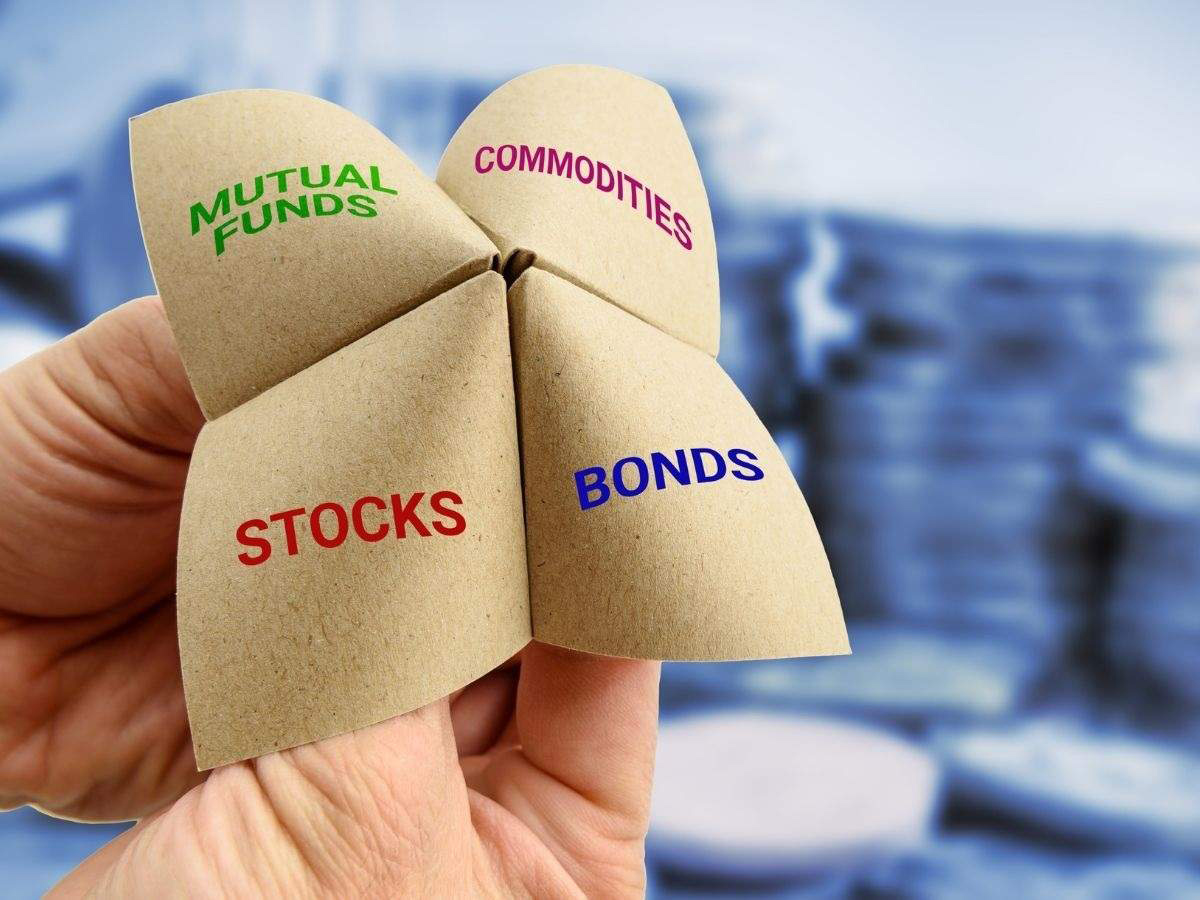

Finance
What Are Corporate Fixed Deposits
Published: December 22, 2023
Learn about corporate fixed deposits and how they can be a useful financial tool. Explore the benefits and risks associated with investing in these fixed deposit schemes.
(Many of the links in this article redirect to a specific reviewed product. Your purchase of these products through affiliate links helps to generate commission for LiveWell, at no extra cost. Learn more)
Table of Contents
Introduction
Corporate fixed deposits are investment instruments offered by companies to individuals and organizations, providing an alternative avenue for generating fixed returns. They are different from bank fixed deposits, as they are issued by non-banking financial companies (NBFCs) or private corporations instead of traditional banks. Corporate fixed deposits have gained popularity among investors due to their attractive interest rates and flexible tenure options.
Investing in corporate fixed deposits offers investors an opportunity to earn higher returns compared to traditional savings accounts or bank fixed deposits. Companies that issue these deposits usually offer interest rates that are higher than bank fixed deposit rates, making them an attractive option for investors looking to maximize their returns.
While corporate fixed deposits can provide investors with attractive returns, it is essential to understand the risks associated with these investments. Corporate fixed deposits are not immune to market risks, and investors should carefully evaluate the financial stability and credibility of the company before investing.
In this article, we will explore the definition, features, benefits, risk factors, and considerations associated with corporate fixed deposits. We will also discuss how to invest in corporate fixed deposits, compare them with other investment options, and highlight the tax implications of this investment instrument. By the end of this article, you will have a comprehensive understanding of corporate fixed deposits and be better equipped to make informed investment decisions.
Definition of Corporate Fixed Deposits
Corporate fixed deposits, also known as company fixed deposits, are financial instruments offered by non-banking financial companies (NBFCs) or private corporations to raise funds for their business operations. They function in a similar manner to bank fixed deposits, but with some key differences.
When investors opt for a corporate fixed deposit, they lend a specific amount of money to the issuing company for a predetermined period of time, known as the tenure. In return, they receive a fixed interest rate on their investment, which accrues throughout the tenure of the deposit. At the end of the tenure, the principal amount along with the accumulated interest is returned to the investor.
Corporate fixed deposits typically have a minimum deposit amount, which can vary from company to company. The tenure of these deposits can range from a few months to several years, providing investors with flexibility in selecting the duration of their investment.
While banks and financial institutions are strictly regulated by the Reserve Bank of India (RBI), corporate fixed deposits are governed by the Companies Act, 2013. Companies issuing fixed deposits are required to comply with certain rules and regulations, including obtaining credit ratings from recognized agencies, maintaining adequate liquid assets, and adhering to various disclosure norms.
It’s important to note that unlike bank fixed deposits, corporate fixed deposits are not covered by insurance. In the event of a company’s default or bankruptcy, investors may face the risk of losing their capital or receiving delayed repayment.
Investors should exercise caution and thoroughly research the financial stability and reputation of the issuing company before investing in corporate fixed deposits. It is advisable to consider the credit ratings assigned by reputed rating agencies, as higher-rated companies are generally considered to have lower default risk.
Now that we have a clear understanding of the definition and basic mechanics of corporate fixed deposits, let’s delve into the features and benefits they offer.
Features and Benefits of Corporate Fixed Deposits
Corporate fixed deposits come with a range of features and benefits that make them an attractive investment option for many individuals and organizations. Let’s explore some of the key features and benefits of investing in corporate fixed deposits:
- Higher Interest Rates: One of the main advantages of corporate fixed deposits is the potentially higher interest rates compared to traditional bank fixed deposits. Companies offering fixed deposits often provide higher rates to attract investors and raise funds for their business operations.
- Tenure Options: Corporate fixed deposits offer flexible tenure options, allowing investors to choose a duration that suits their investment goals and financial needs. Tenure periods can range from a few months to several years, providing investors with the opportunity to align their investments with their future plans.
- Regular Income: Corporate fixed deposits offer a reliable source of income as the interest is paid out periodically, either on a monthly, quarterly, half-yearly, or annual basis, depending on the terms of the deposit. This can be particularly beneficial for individuals seeking regular income or retirees looking for steady cash flow.
- Fixed Returns: Unlike some other investment options that are subject to market fluctuations, corporate fixed deposits provide fixed returns. The interest rate is predetermined, giving investors clarity on the returns they can expect at the end of the tenure.
- Diverse Investment Options: There are various companies offering corporate fixed deposits, allowing investors to diversify their portfolio by distributing their investments across different issuers. By spreading the risk, investors can minimize the impact of defaults or financial setbacks by a single company.
- Accessibility: Corporate fixed deposits are accessible to both individuals and organizations, making them a versatile investment option. They can be a suitable choice for individuals, HUFs (Hindu Undivided Families), trusts, and even corporate entities looking to park surplus funds for a fixed period.
While the features and benefits of corporate fixed deposits make them an appealing investment choice, it’s important to consider the potential risks and factors one should assess before investing. Let’s explore these aspects in the next section.
Risk Factors and Considerations
While corporate fixed deposits offer attractive returns and benefits, it is crucial for investors to be aware of the potential risks associated with these investments. Here are some key risk factors and considerations to keep in mind:
- Credit Risk: The main risk with corporate fixed deposits is the credit risk. Since these deposits are not backed by the government or covered by insurance, there is always a possibility of default by the issuing company. It is essential to thoroughly research the financial stability, track record, and creditworthiness of the company before investing.
- Market and Liquidity Risk: The market and liquidity conditions can impact the ability of the issuing company to honor its fixed deposit obligations. In times of economic downturn or financial crises, companies may face difficulties in meeting their financial obligations, which can create liquidity issues. Investors should assess the market conditions and the company’s financial position before investing.
- Interest Rate Risk: Corporate fixed deposits come with a fixed interest rate, which means that if market interest rates rise, the fixed deposit returns may become less attractive compared to other investment options. Conversely, if market interest rates decline, the fixed deposit returns remain unchanged, potentially resulting in missed opportunities for higher returns.
- Lack of Liquidity: Unlike bank fixed deposits, corporate fixed deposits generally come with limited liquidity options. Once the investment is made, it is locked in for the specified tenure, and premature withdrawal may attract penalties or additional charges. Investors should carefully assess their liquidity requirements and consider the lock-in period before investing.
- Company-Specific Risk: Every company has its own unique set of risks, such as industry-specific risks, management capabilities, and competitive pressures. It is important to analyze the financial health, business model, growth prospects, and overall risk profile of the issuing company before investing in their fixed deposits.
Considering these risk factors and conducting thorough due diligence can help investors make informed investment decisions. It is advisable to diversify investments across different issuers, opt for higher-rated companies, and stay updated on the financial performance of the invested companies.
Now that we have examined the risk factors and considerations, let’s explore how investors can invest in corporate fixed deposits.
How to Invest in Corporate Fixed Deposits
Investing in corporate fixed deposits is a relatively straightforward process. Here are the steps to follow when considering investing in corporate fixed deposits:
- Research and Due Diligence: Begin by conducting thorough research on companies offering corporate fixed deposits. Look for issuers with a strong financial track record, good credit ratings from recognized rating agencies, and a reliable reputation in the market. Evaluate the risks associated with the company and assess their ability to fulfill their financial obligations.
- Compare Interest Rates: Compare the interest rates offered by different issuers to identify the most competitive rates available in the market. Higher interest rates can significantly impact your returns, so it’s important to select an issuer that offers attractive rates for the desired tenure.
- Read the Terms and Conditions: Carefully review the terms and conditions of the corporate fixed deposit scheme provided by the issuing company. Pay attention to important details such as the minimum deposit amount, tenure options, interest payment frequency, premature withdrawal penalties, and any additional charges or fees applicable.
- Submit the Application: Once you have selected a suitable corporate fixed deposit scheme, complete the application form provided by the issuing company. Ensure that all required documents and information are accurately filled in and attached as per the instructions provided.
- Make the Investment: To invest in the corporate fixed deposit, you will need to provide the required investment amount in the form of a cheque, demand draft, or through electronic transfer. Follow the instructions provided by the issuing company to complete the investment process.
- Receive Confirmation: Upon successful completion of the investment process, you will receive a confirmation document from the issuer. This document will contain all the relevant details of your corporate fixed deposit, such as the deposit amount, tenure, interest rate, and maturity date. Keep this document safe for future reference.
It’s essential to remember that investing in corporate fixed deposits carries inherent risks, as discussed in the previous section. It is recommended to diversify your investments among different issuers to mitigate the overall risk and consider seeking professional financial advice if needed.
Now let’s compare corporate fixed deposits with other investment options to understand their unique characteristics and benefits.
Comparison with Other Investment Options
When it comes to investing, there are various options available in the market. Let’s compare corporate fixed deposits with some popular investment options to understand their unique characteristics:
- Bank Fixed Deposits: Bank fixed deposits are offered by banks and are considered relatively safer due to the regulatory oversight and deposit insurance coverage. While bank fixed deposits may offer lower interest rates compared to corporate fixed deposits, they provide a higher level of security as the investment is backed by the bank’s reputation and government guarantees.
- Mutual Funds: Mutual funds pool money from multiple investors to invest in a diversified portfolio of stocks, bonds, or other assets. Mutual funds offer the potential for higher returns but also come with higher risks. Unlike fixed deposits, mutual funds are subject to market fluctuations and require active management by professional fund managers.
- Stocks and Equities: Investing in stocks and equities provides the opportunity for high returns, but it also carries higher risks. Stock market investments are subject to market volatility and require a sound understanding of stocks, companies, and investment strategies. Unlike fixed deposits, the returns on stocks and equities are not fixed and can fluctuate significantly.
- Government Bonds: Government bonds are debt instruments issued by the government to raise funds. These bonds provide a fixed return over a specified period and are considered relatively safer compared to corporate fixed deposits. Government bonds often have lower interest rates compared to corporate fixed deposits, as they are backed by the government’s creditworthiness.
- Real Estate: Real estate investment involves purchasing properties such as residential, commercial, or land for potential appreciation or rental income. Real estate investments can provide long-term returns, but they come with higher capital requirements, maintenance costs, and market fluctuations. Compared to fixed deposits, real estate investments offer potential for capital appreciation but have lower liquidity.
Each investment option mentioned above has its own set of advantages, risks, and suitability based on the investor’s financial goals, risk tolerance, and investment horizon. Corporate fixed deposits provide a balance between fixed returns and moderate risk. They are attractive to investors seeking stable income with potentially higher returns compared to traditional bank fixed deposits.
Before making any investment decisions, it is important to consider your financial goals, risk appetite, and consult with a financial advisor if needed. Now, let’s explore the tax implications of investing in corporate fixed deposits.
Tax Implications of Corporate Fixed Deposits
Investing in corporate fixed deposits has certain tax implications that investors should be aware of. Let’s explore the tax treatment of corporate fixed deposits in India:
- Interest Income: The interest earned on corporate fixed deposits is treated as taxable income. It is added to the investor’s total income and taxed according to their applicable income tax slab rate. The issuing company usually deducts tax at source (TDS) on the interest earned if it exceeds a specified threshold. It is important for investors to report this interest income in their income tax returns.
- Tax Deducted at Source (TDS): The issuing company is required to deduct TDS on the interest paid to the investor. The TDS rate is determined based on the investor’s PAN card details and the interest earned. The current TDS rate is generally 10% for individuals who have provided their PAN details. However, if the PAN details are not provided, the TDS rate could be higher (currently 20%).
- Form 15G/15H: Individuals can submit Form 15G (for individuals) or Form 15H (for senior citizens) to the issuing company to avoid TDS if their total income is below the taxable limit. These forms declare that the individual’s income is below the taxable limit, and hence no TDS should be deducted on their interest income.
- Taxable Returns: While corporate fixed deposits provide fixed returns, investors should be aware that the actual returns may be lower after accounting for taxes. It is important to consider the post-tax returns while evaluating the overall profitability of investing in corporate fixed deposits.
- Tax Planning: Investors can plan their taxes by spreading their investments across different financial instruments. By diversifying their investment portfolio, individuals can take advantage of tax-saving investments such as ELSS (Equity Linked Saving Scheme), PPF (Public Provident Fund), or tax-saving fixed deposits, which offer tax benefits under specific provisions of the Income Tax Act.
It is recommended to consult with a tax advisor or financial planner to better understand the tax implications of investing in corporate fixed deposits and to ensure compliance with tax regulations.
Now, let’s summarize the key points discussed in this article.
Conclusion
Corporate fixed deposits provide investors with an alternative option for generating fixed returns on their investments. These deposits offer higher interest rates compared to traditional bank fixed deposits, making them an attractive choice for individuals and organizations looking to maximize their returns. However, it’s important to consider the risks associated with corporate fixed deposits, such as credit risk, market risk, and lack of liquidity.
Before investing in corporate fixed deposits, investors should conduct thorough research and due diligence on the issuing company’s financial stability, credit rating, and track record. Diversifying investments among different issuers and carefully evaluating the terms and conditions of the deposit scheme can also help mitigate risk.
While corporate fixed deposits offer stable and fixed returns, it’s crucial to compare them with other investment options and understand their unique characteristics. Consider factors such as risk appetite, investment goals, and liquidity requirements when making investment decisions.
Investors should also be mindful of the tax implications of investing in corporate fixed deposits. The interest earned on these deposits is taxable income and is subject to TDS. It is important to report this income and consider the impact of taxes on the overall returns.
In conclusion, corporate fixed deposits can be a viable investment option for those seeking fixed returns with moderate risk. By understanding the features, benefits, risks, and tax implications associated with corporate fixed deposits, investors can make informed decisions and effectively manage their investment portfolio. It is advisable to consult with a financial advisor or tax professional for personalized guidance based on individual financial circumstances.














